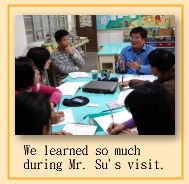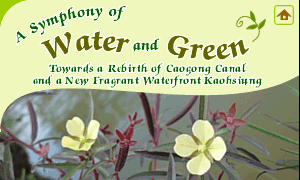 |
Director of Taiwan Wetland Protection Organization
Mr. Yao-ting Su
¡»Date¡G10th, Jan,2007(Wed.)
¡»Location¡GDong Guan Elementary School Classroom No.5
¡»Interviewers¡GYi-Wen Chen, Chen-Kai Chang
Jia-Wen Yu, Yu-Jo Li |
|
Director of Taiwan Wetland Protection Organization, Mr. Yao-ting Su came to our school on January 10th, 2007 and discussed matters about the possibility of reconstructing a wetland on our campus. The following is our interview with Mr. Su. |
Q¡GTell us about yourself. |
A¡GI work in the Chouchai wetlands. I also like Nature, so I work as a volunteer at the Wildlife Protection Association, and sometimes work as a tour guide for natural environments in the Kaohsiung area. At the place I work, everyone has a nickname of an animal or plant; because I am tall and strong, people call me Redwood.The Chouchai wetlands are four years old now, and I have been working there for three and a half years, which makes me a senior worker there. I am in charge of the planning and the financing of Chouchai wetlands. Due to my experience there, I currently am the director for this organization. There is a lot of other work to do now, and so my director duties are handed over to one of my colleagues. I am working on the construction of Banping Lake wetlands, which is a very different challenge. It's not like the wetlands of the city, Banping Lake wetland is a mountainous, rock-filled wetland. I even accepted a rebuilding project for the Yuan-chung Port wetland. I am the vice director there, so as soon as my personal work is finished to a certain extent, I will devote myself fully to the Yuan-chung Port wetlands. |
Q¡GWere there any difficulties when you were constructing? |
A¡GBanping Lake wetland is considered an inland-type wetland, which is located very close to the mountains. Our organization has no experience in maintaining this kind of wetland, so we think it is a very big challenge. We have to thank so many scholars and experts for providing us with precious data and information regarding these matters. For example, there are several types of limestone; they are mostly the same and differ only in their water quality. We have attempted to copy the scenery at the sea location to the Banping Lake wetlands, and see if they are suitable for Banping Mountain. We also plan to gather precious resources from Chai and Guei Mountain, in order to link Banping Lake to other wetlands, making it a part of the ecological corridor. |
Q¡GWhat is the route for the ecological corridor in Kaohsiung? |
A¡GThe route of this corridor, from north to south will begin from Caogong Canal and KaoPing Creek respectively, then to Chen-Ching lake wetlands, the Banhe Village Flood Detention Pond, the Chinshih Lake wetlands, the Banping Lake wetlands, the Chouchai wetlands, the Neiweipei Wetland (at the Museum of Fine Arts ) wetlands, the Jhongdu Love River wetland, and finally the Yanshuei Harbor wetlands. |
Q¡GAre there any plans for the future of Banping Lake wetlands? |
A¡GThe first project would be to construct a path to walk on, citizens can arrive swiftly to the Banping Lake wetlands and let them understand and see this place. When the construction of pathway is finished, the view will be better; it would be very nice for bird watching and educational purposes. We shall plant abundant species of plants in the near future and present these plans to the government. Although the authorities concerned have not replied yet, we estimate that things will get started by the second half of this year. |
Q¡GWhat is the government's attitude toward these plans? |
A¡GAlthough they were not as active as we thought they would be, but they did provide us support. The government officials hope that we wetland organization can give them a few suggestions. When their specialists think it is ok, then they will start passing out contracts for construction. After that, they will look for environmental groups to do the maintenance work. For instance, NGO and the Bird Society, and the Love River Association are all responsible for maintenance of the Chouchai wetland. They have their own professional domain, yet they lack practical experiences, so the wetland organization offers them a helping hand when needed. In the future, Banping Lake will probably be managed in the same way; that is, adoption by environmental groups and Kaohsiung Wild Bird Society. |
Q¡GIn your opinion, do you think the Kaohsiung Government has been active enough when it comes to your plans of constructing the wetland corridor project? |
A¡GThey are active to a certain level, because they want to have positive results, too. They do not know how or where to start, and that is why we can freely plan things and let them be the one to decide who will be the contractors and constructors. |
Q¡GTherefore, did the government seek help from you, or did you go ask them for help? |
A¡GBoth. Actually, if it was a new issue or plan, they would help us. Now that we reach a certain standard, they (the government) start asking us to assist them in adopting wetlands. In the beginning, there were no high expectations for the Chouchai wetlands. It is because there were real estates and property issues regarding this piece of land that they began to emphasize the project. Under such conditions, the government just dug up a pond and financed us, and told us where to get started. At least the city council would stop arguing that the place was a bunch of weeds and in turn, let us begin construction.
At the same time, the wetland organization joined this process, and this is how it all began. The government thought that this would all be over in a few months since no significant results showed up during the first year. By the second year, however, residents started to understand the importance of the Chouchai wetlands, and began to visit this place. Volunteers poured in to help and spread the word out, helping us gain more recognition from the public.
From then on, the government used the construction of the Chouchai wetland as a reference for future development. They understood that it was not just an ordinary park for people to visit, and that people liked this idea very much. When scholars and specialists abroad came to Kaohsiung for a visit, we would take them to the Chouchai wetlands, and let them see an unusual spot that is rarely located in the cities of Taiwan. Considering that we are one of the two municipalities, we are the first and only to have built this kind of unique park; we have also let our jacana birds return to Kaohsiung, their homeland. By adding the concept of wetlands, parks of today are not what they were before anymore, it will bring out different flavors when seasons change, and provide the visitors a new taste every time they go there.
There are now nine wetlands in Kaohsiung city. I look back at the past three years, and I see the government letting us experiment on Chouchai wetland in the first year. The second year was nice; we were invited to plan and construct the Ban-he Village Flood Detention Pond. This is how we interacted with the government. The Chouchai wetlands became a fine model for other constructions of wetlands to follow; this in turn initiated the development of other wetlands and construction. |
Q¡GCould you tell us about the history of the wetland organization? |
A¡GThe wetland organization is six years old now. Specialists, environmental groups, and professors who were highly interested in wetlands founded it. The professors investigated precious woods and ecosystems; they found out that organisms living at the shoreline were very diverse. If they were destroyed by human cultivation, it would be a tragedy. This is why they founded an association to protect the endangered species of animals and plants.
The wetland organization has focused on some of the ecosystem problems in Taiwan and came up with valuable data to discuss with the government for improvement. It apparently was better than protesting. The communication process is peaceful,which is better for both parties. Slowly and gradually, these gatherings contributed to the formation of the wetland organization. It used to be the wetland organization of the Republic Of China, but due to political reasons, we changed its name into the Wetland Protection Association. We do not have enough funds to create wetlands yet, so we can only conserve wetlands for now and set up several protected areas. We then send people over there to help manage and maintain the place. |
Q¡GWhat do the residents near the Chouchai wetlands think about it? |
A¡GTo be frank, some local residents are not very happy about it. When the government was collecting this piece of land, all of the residents there had received their share of compensation fees, but they still protested fiercely. They saw all the new buildings constructed around the wetlands and thought about how good it would be if they could still keep their piece of land. They certainly feel quite unhappy about it, but what is done is done, due to the following reasons:
1.It is the land reserved for park usage.
2. It has become a place where everyone is willing to visit after the Wetland Organization has tidied it up.
For these reasons, I would say that perhaps 50% of the residents are happy we did it, and I hope that more people will give us recognition in the future. |
Q¡GDid the local residents try to stop the progress of Chouchai wetland construction? |
A¡GWe hosted a few local activities at the beginning of construction; most of our guests were children. We always gave them lectures on Nature. Middle-aged people visited least often, and many elder residents just somehow did not like this place. Although the local residents did not like it, many people from other places even as far as Hsiao Kang, loved it. We currently are urging the locals to come join us, and they like the place very much. |
Q¡GHave the local residents participated in doing some volunteering work? |
A¡GYes, some of them are long-termed volunteers. Not many,though. We are very satisfied; at least we are not disturbed by their protests. We used to get the cold shoulder every time we had a meeting in their community; they complained about the bugs and mosquitoes or about how they could've gotten a piece of land back. Of course, everyone has their own opinions, but we hope that this land can belong to everyone and the next generation. |
Q¡GYou mentioned that the next mission would be the Yuanjhong Harbor wetlands, how is this project going now? |
A¡GThe plans for Yuanjhong Harbor wetlands are not exactly finished, but the first phase of construction has already been completed. The first phase focuses on salt-water, the second phase is on the semi salt-water, and the third phase is on fresh water. The first phase is easy; we have abundant resources in fiddler crab and mangrove. The second phase is more toward breeding the fish. The last part is to drain the water from DianBow River into wastewater facilities and release it into farther and deeper parts of the sea.
The western part of Yuanjhong Harbor wetlands used to be reserved for navy military uses. Now all fish farms are collected, and no more breeding is permitted since the fishermen have already received compensation. The government gave us a piece of the land for development of Yuanjhong Harbor wetlands. 70% of work in Yuanjhong Harbor wetlands is finished now. The water is starting to flow inside, and we just began planting the seeds. When that is done, we will check and inspect the quality; hopefully, all tasks and phases will be done in 4 years! We hope that the Yuanjhong Harbor wetland can be the largest in the southern part of Taiwan, or even the largest in Taiwan. It also posesses wastewater processing, clarifying, ecosystem and scenery value functions; linking them together becomes what we call the Ecological Corridor. |
Q¡GYou have another job, yet you work at the wetland organization as a volunteer. What motivates you to do this kind of work? |
A¡GI have always been interested in wildlife and outdoor activities for long. The reason why I became a tour guide is that I love going outdoors. I can see the animals and plants I love and share it with my friends. Later, I suddenly realized that either tour guiding or introducing Nature to others belongs to "consuming behavior" at the expense of mother nature. Even in small amount, we still destructed mother nature and consumed in some way. However, not many people are doing productive activities, which are what we have benn promoting. We can see and feel mother nature, how about trying to help her out? We can let ourselves become producers of nature, and recover what has been lost before. The Chouchai wetland is an example, we made up something that had once disappeared before, and now it is here. Our main goal is to try to stop being a consumer and become a producer of nature. |
Reflection
After our discussion with Mr. Su, we understood the passion these people had in their hearts. They do everything to give things back to the society and nature, there are so many things to understand and learn from. We all have to change our attitudes toward Mother Nature; only by this will our lives and future be improved.
|
|
|

